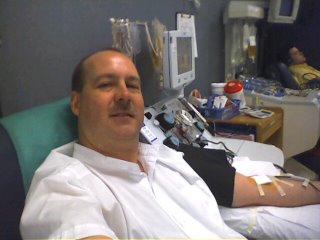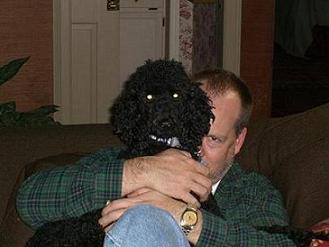I do. RUABelle and I used to spend a lot of time there-at least 2-3 trips per year and every other JazzFest. We have a close friend who worked for the biggest wine and liqour wholesaler in New Orleans and lived within walking distance of the Festival Fair Grounds. She also knew everyone at every bar and every restaurant in town, thanks to her job. Talk about the hook up!
But now, even she has abandoned the city of her birth. She says it's just too depressing to move back and there's no jobs for people in the intoxication business. She spent almost a month living in her car with her tiny dog in a campground in Mississippi, worrying about the cat she left behind anticipating a 1-2 day evacuation. Unbelievably, when she did return to her mostly flooded shotgun house in Midtown, she found a very pissed-off skinny kitty living on top of the refrigerator. She figures the rising water drove enough rodents into her house for the cat to survive on. That's pretty much a metaphor for the city I saw when I visited last week for the first time since that bitch, Katrina rolled through.
As I picked up my rental car at the airport, I felt the same type of dread you do on the way to a funeral home where you know someone you love will be lying in an open casket. I remembered how the airport had been turned into a MASH unit and then ironically hit by a tornado several months later. The scars from both events are still visible in the terminals.
The drive east from Metarie was like a trip down the circles of Dante's Inferno. The damage worsened with each passing mile, and it looked like the storm had just hit yesterday. I knew that each house I saw with a hole chopped through a third story roof or an "X" painted on the door held a story of personal tragedy and/or survival. What especially struck me was the lack of clean up. I only saw a few places where the rubble had been piled up, and the only construction I saw was of fences to protect and isolate property.
When I crossed the bridge into Chalmette, a vista stretched out all the way to the French Quarter. A brownish-grey layer of mud covered the thousands of wrecked and abandoned domiciles and created a post-nuclear ashy look to the devastated area. They had just started to knock down houses in the 9th ward the day before I arrived.
I continued east on I-10 across the newly-repaired bridge to Slidell. This was part of a 10 mile stretch of commercial property where I only saw one open business, and it was a Home Depot. The swampy area around Slidell still showed the scars of the storm with huge trees flattened and no signs of life in what had once been an incredibly diverse biosystem. This area had not fallen victim to collapsed levees. Rising water is no big deal in a swamp. It had been scoured to death by the tremendous power of the storm.
Wind damage was the obvious culprit for more of the destruction as I headed toward Biloxi and Gulfport. While these cities were devastated, Waveland, Mississippi is simply no longer there. Its few returning residents are proposing to merge their town with Bay St. Louis in the hope that 0 + 1/2 can somehow equal 1.
The difference between Biloxi/Gulport and New Orleans is that in Mississippi, the residents have cleaned up the debris and are actively working to rebuild. In New Orleans, everyone is still waiting around for someone to come help them like they have since the first night in the Superdome.
The Mississippi Gulf Coast had a plan and they reacted. After Hurricane Camille, they developed communication and response strategies to facilitate their recovery. They have already reopened businesses and begun to repatriate their affected areas. There is real commerce going on, and remember, this is MISSISSIPPI. #49 or #50 in every social/economic ranking from education to prevention of rickets.
So what's the reason that Mississippi has begun recovery and Louisiana hasn't? It's partially due to demographics and partially due to bureaucracy. As crooked as MS politics has occasionally been, it cannot rival LA for its inefficiency. Don't look for either the mayor of "Chocolate City" or the governor of the bayou state to survive their next election.
And the people that fled the Big Easy to other cities don't necessarily want to return. The upper crust that lived in old mansions in the Garden District lived there because their home had been in the family for generations. I doubt that they'll see the charm in returning to a new McMansion being built in the same lot, especially if their next door neighbors chose not to return in favor of taking FEMA money to allow more space for trailers. The poor residents of New Orleans don't have the wherewithal to start over, and many of them have found charity and better lives in other places all over the country. They won't be back.
The big decision with every parish, neighborhood, block and house in New Orleans revolves around three options: rebuild, rezone commercial, or abandon. These choices are being made at many levels from the bureaucratic to the very personal. But there is no overarching plan to save the city yet like in Mississippi.
I still have hope. This next mayoral election is crucial. There are almost 30 candidates running, and whoever wins may very well be the loser in the end. It may be an impossible job, but it must be undertaken! New Orleans will never be the same, but if the people can work together to make it a place where folks want to come home to, and not just yard-of-margarita-guzzling partygoers, then the soul of the city can be revived.
If you would like to pitch in from a distance, I can't think of a better way to help restore this soul than to help out the displaced older musicians of the city who preserve its heritage through their art. There is a benefit CD project available at amazon.com. The proceeds will go to a specific arm of Habitat for Humanity to rebuild housing for elderly musicians. Go
here and buy one today!









